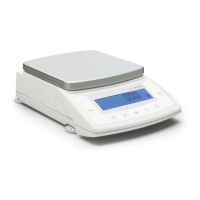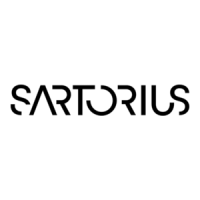Do you have a question about the Sartorius CPA26P and is the answer not in the manual?
General safety advice for balance operation and handling to prevent damage to equipment.
Safety considerations specific to the installation of the balance, including voltage and cable checks.
Guidelines for storing and transporting the balance to prevent damage from extreme conditions.
Instructions for safely unpacking the balance and checking for any external damage.
Guidance on choosing a location, installing, and acclimating the balance to room temperature.
Explanation of the control seal for verified balances and its implications for legal metrology.
Steps for installing the CPA2P model balance components, including draft shield.
Steps for installing the CPA2P-F model balance, including filter pan.
Instructions for fitting the draft shield on analytical balances.
Steps for placing components with a triangular weighing pan shape.
Steps for placing components with a round weighing pan shape.
Procedure to connect CPA26P/CPA225D models to the balance electronics box.
Instructions for fitting a 3-sided draft shield onto the balance.
Installing components for rectangular pans with capacity up to 10 kg.
Installing components for rectangular pans with capacity over 10 kg.
Specific steps to connect CPA26P/CPA225D models to AC power.
Information on using country-specific power cords with the AC adapter.
Connecting balances with weighing capacity over 10 kg to AC power.
Safety notes and installation requirements for plug-in AC adapters.
Details and safety for the universal AC adapter.
FCC requirements for Class A digital devices and interference.
FCC requirements for Class B devices and interference mitigation.
Guidance on checking the FCC class of the equipment.
Steps for connecting external devices like printers or PCs.
Specifies the required warmup periods for different balance models.
Instructions for using the antitheft locking device on balances.
Explanation of why leveling is necessary for accurate weighing.
Steps to level balances with a weighing capacity up to 10 kg.
Steps to level balances with a weighing capacity over 10 kg.
Identifies and explains display elements and operating keys.
Detailed explanation of each key's function and display indicators.
Explains the use of the basic weighing function alone or with application programs.
Lists key features like taring, assigning IDs, and printing.
Compliance requirements for verified balances before basic weighing.
Steps like switching on, display test, and taring the balance.
Instructions for filter weighing using the CPA2P-F model.
Instructions for using the below-balance hanger on analytical/precision balances.
Instructions for using the below-balance hanger on microbalance CPA2P models.
Defines calibration (difference determination) and adjustment (correction).
Requirements for verified balances before calibration/adjustment.
Conditions and methods for performing calibration/adjustment.
Specifics for external calibration of Class II balances.
Step-by-step guide for internal calibration and adjustment.
How to configure the calibration/adjustment sequence in the Setup menu.
Explanation of the isoCAL function and its automatic activation.
Restrictions and temperature ranges for isoCAL on verified balances.
Adapting the balance to individual requirements via the Setup menu.
How to open and navigate the Setup menu.
Instructions on how to print current menu settings.
Configuring environment parameters for records and display.
Details on entering IDs, date/time, and brightness levels.
Explains keys used for navigating and confirming configuration settings.
Explains the F and CF keys for starting and ending application programs.
How application programs apply to verified balances.
Weighing components to achieve a defined total component weight.
Weighing up to 99 components, storing, clearing memory, and auto printout.
Examples of data printouts for the net-total formulation program.
Determining the number of parts by weighing a reference quantity.
Minimum load, setting reference quantity, and optional output.
Explains F and CF keys for the Counting program.
How to set and store the reference sample quantity.
Using a reference balance for higher counting precision.
Configuring settings for using a reference balance.
Obtaining weight readouts in proportion to a reference weight.
Minimum load, reference percentage, storage parameter, decimal places.
Explains F and CF keys for the Weighing in Percent program.
How to set and store the reference percentage.
Determining weights of unstable samples or under unstable conditions.
Manual/automatic start, min load, animal activity, number of ops.
Explains F and CF keys for the Animal Weighing program.
How to set and store the number of subweighing operations.
How to configure and use the weight unit toggling function.
Using the F key to switch between weight units.
Generating printouts for documentation, including line format and parameters.
Default settings for manual/automatic printing and line format.
Instructions for printing initialization values for active programs.
Outputting ambient characteristics and parameters for records.
Automatic weight value printing and its control settings.
Examples of printouts without identification codes.
Examples of printouts including identification codes.
Examples of printing initialization values.
Examples of automatically printed weight readouts.
Parameters included in GLP headers (date, manufacturer) and footers.
Menu codes for configuring ISO/GLP records and line format.
Connecting to computers or peripheral devices via the serial port.
Type, standard, transmission rates, parity, format, handshake.
Default settings for transmission rate, parity, stop bits, handshake.
How non-verified digits are identified in printouts.
Structure of data output with 16 characters.
Explanation of special characters used in data output.
How error codes are displayed in the data output.
Examples of data output formats with ID codes.
Details on Format 1 and Format 2 control commands.
Lists command characters and their functions for data input.
Setting parameters like baud rate, parity for data communication.
Explains hardware and software handshake methods for data transfer.
How software handshake controls data flow using XON/XOFF.
Transmitting print commands via key press or software command.
How automatic output works and its configuration.
Details on female and male interface connectors.
Important warning about using non-Sartorius RS-232 cables.
Specific pin assignments for the interface connector.
Lists display errors, their causes, and solutions.
Further troubleshooting for weight readouts and calibration issues.
Steps to prepare CPA2P/CPA2P-F models for transport.
Information on service contracts and authorized repairs.
How to safely clean the balance using mild detergent.
Specific instructions for cleaning stainless steel parts.
How to clean internal parts of the balance, including draft shield.
Procedure for checking safe operation and contacting service.
Guidelines on disposing of packaging, equipment, and batteries.
Detailed technical specifications for CPA2P and CPA2P-F models.
Detailed technical specifications for various CPA and GCA models.
Detailed technical specifications for GCA models.
Detailed technical specifications for CPA models.
Detailed technical specifications for CPA and GPA models.
Detailed technical specifications for CPA models.
Detailed technical specifications for CPA models.
Detailed technical specifications for CPA models.
Detailed technical specifications for CPA and GC models.
Detailed technical specifications for CPA and GPA models.
Detailed technical specifications for CPA models.
Detailed technical specifications for CPA models.
Details on the Sartorius data printer with LCD.
Information on the reflective remote display.
Details on battery packs for extended operation.
Information on carrying cases for different balance models.
Software for direct transfer of weighing data to applications.
Kit for density determination.
Special weighing pan for static-sensitive materials.
Calibration weights available with DKD certificate.
Guide for optimal balance use in quality management systems.
Details on AC adapters for different capacities and voltage.
Accessory draft shield chambers for specific models.
Specific draft shield covers for various models.
Cables for PC connection (25-pin and 9-pin).
Adapter for connecting different D-Sub connectors.
Switches for remote balance control (F, TARE, CF).
Notes on T-connector usage with peripheral devices.
Accessory hanger for specific models.
Nickel chromium steel weighing bowls of various volumes.
Dust covers for display units of various balance models.
Information on Council Directive 90/384/EEC for weighing instruments.
Services included in new installation packages for optimal results.
Sartorius' verification services for legal metrology.
Information on maintaining verification validity in European countries.
Details on plates and symbols for BC/BD BL models.
Details on plates and symbols for BF BL 500 model.
Explanation of symbols like K, M, S, MD, T on balance plates.











